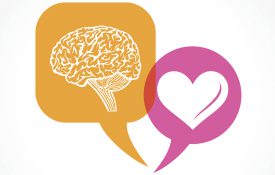-

Brain Can Be Trained in Compassion, Study Shows
A study shows that training adults in compassion can result in greater altruistic behavior.
-
New Research From Psychological Science
Read about the latest research published in Psychological Science. Deliberation's Blindsight: How Cognitive Load Can Improve Judgments Janina A. Hoffmann, Bettina von Helversen, and Jörg Rieskamp When one is under a high cognitive load, why does task performance increase in some cases but decrease in others? Participants performed a multiple-cue judgment task in which they switched from a rule-based to a similarity-based judgment strategy as cognitive load increased. This switch in strategy harmed their performance on linear judgment tasks but improved their performance on nonlinear judgment tasks.
-
Still Charting Memory’s Depths
The New York Times: MONTREAL — In many ways, the Obama administration’s new plan to map the human brain has its origins in the work of Brenda Milner, the neuropsychologist whose detailed observations of an amnesia patient in the 1950s showed how memory is rooted in specific regions of the brain. “Prior to Brenda Milner’s discoveries, many behaviorists and some cognitive psychologists followed the lead of Freud and Skinner in abandoning biology as a useful guide to the study of memory,” the Nobel laureate Dr.
-
You are less beautiful than you think
Salon: In April 15, 2013, Dove launched a 3-minute video entitled “Dove Real Beauty Sketches.” The video achieved instant popularity and has been watched millions of times — a successful viral campaign which has been widely talked about. In the video, a small group of women are asked to describe their faces to a person whom they cannot see. The person is a forensic artist who is there to draw pictures of the women based on their verbal descriptions. ... The most direct evidence that the Dove commercial is misleading comes from the work of Nicholas Epley of the University of Chicago and Erin Whitchurch of the University of Virginia. Read the whole story: Salon
-
How the hot hand delusion messes with the game
The Boston Globe: HERE’S SOME ADVICE for NBA coaches: If one of your players is on a hot streak, tell him to cool off. An analysis of consecutive shots in the 2010-2011 NBA season finds that players who had just scored during regular play (not a free throw), especially from longer range, were more likely to take the next shot for their team. However, that follow-up shot was riskier, as it was more likely to be taken from longer range, and was therefore more likely to miss. Read the whole story: The Boston Globe
-
The new (and nastier) ageism
America is a rapidly graying society. This demographic trend has been underway for a while—and anticipated for a long while—yet some of its implications are just now coming into focus. Most notably, the aging of America will almost certainly trigger a retirement crisis, with elderly boomers competing for limited financial and medical resources—and working longer just to stay afloat. The elderly have never been honored in American society. They have more often been stereotyped, stigmatized and pitied as outdated and weak, both physically and mentally.

